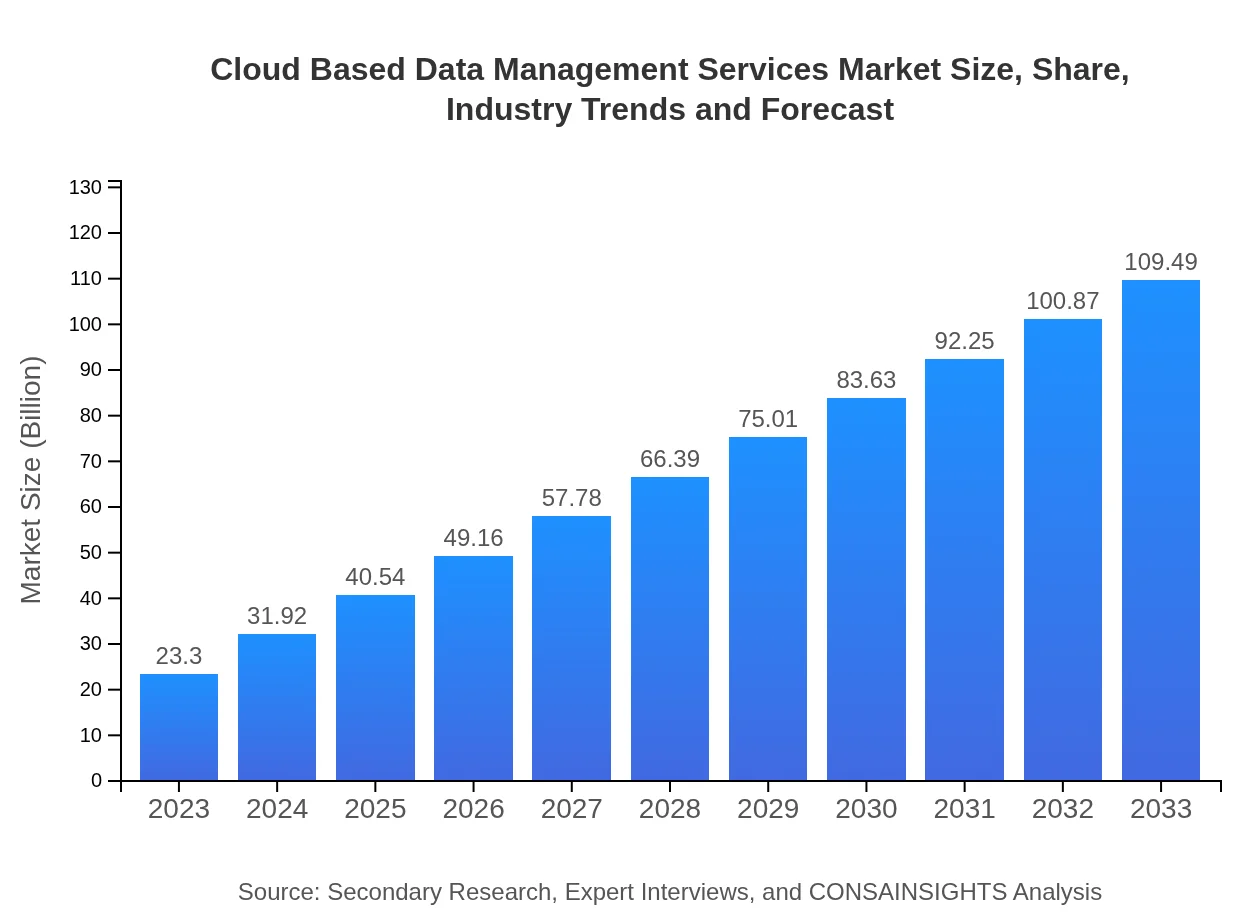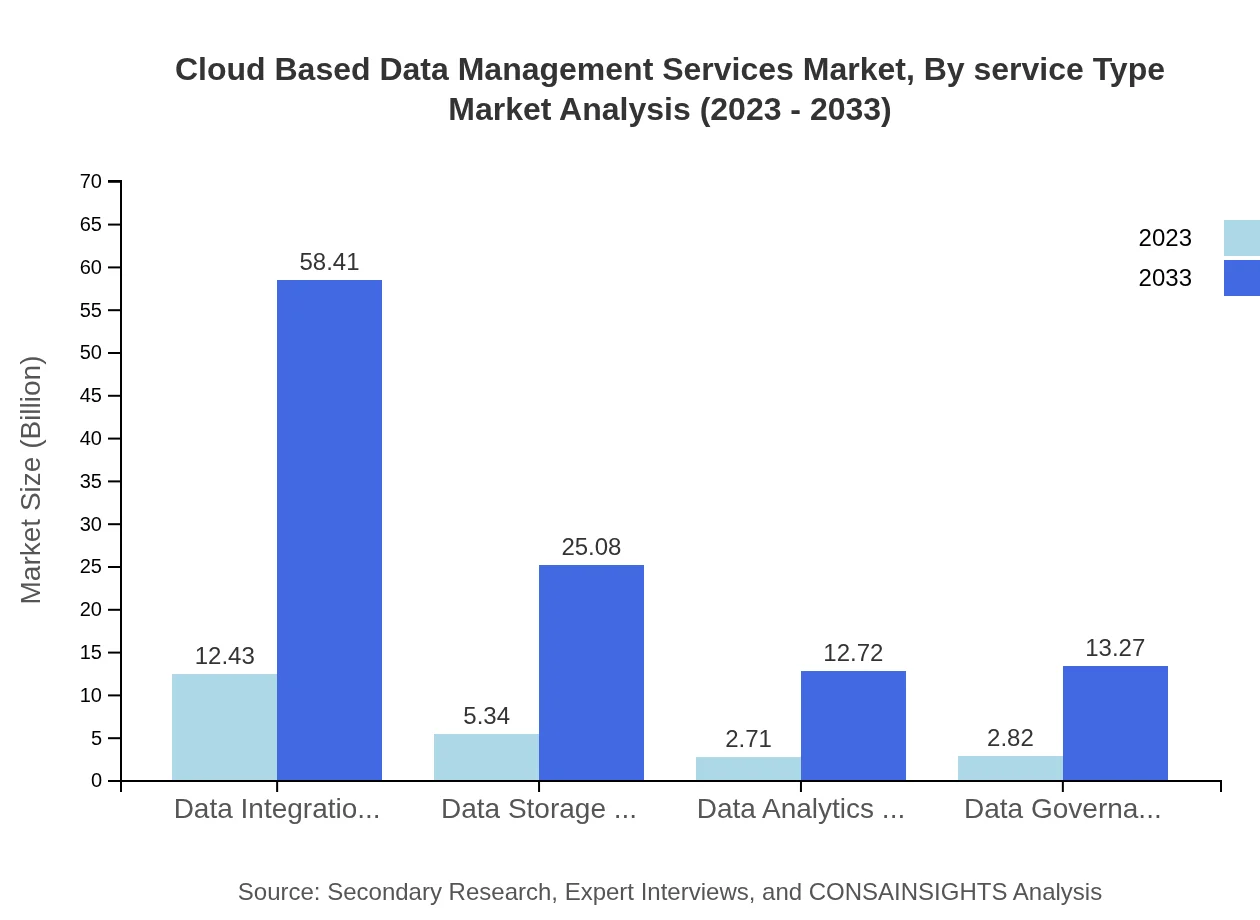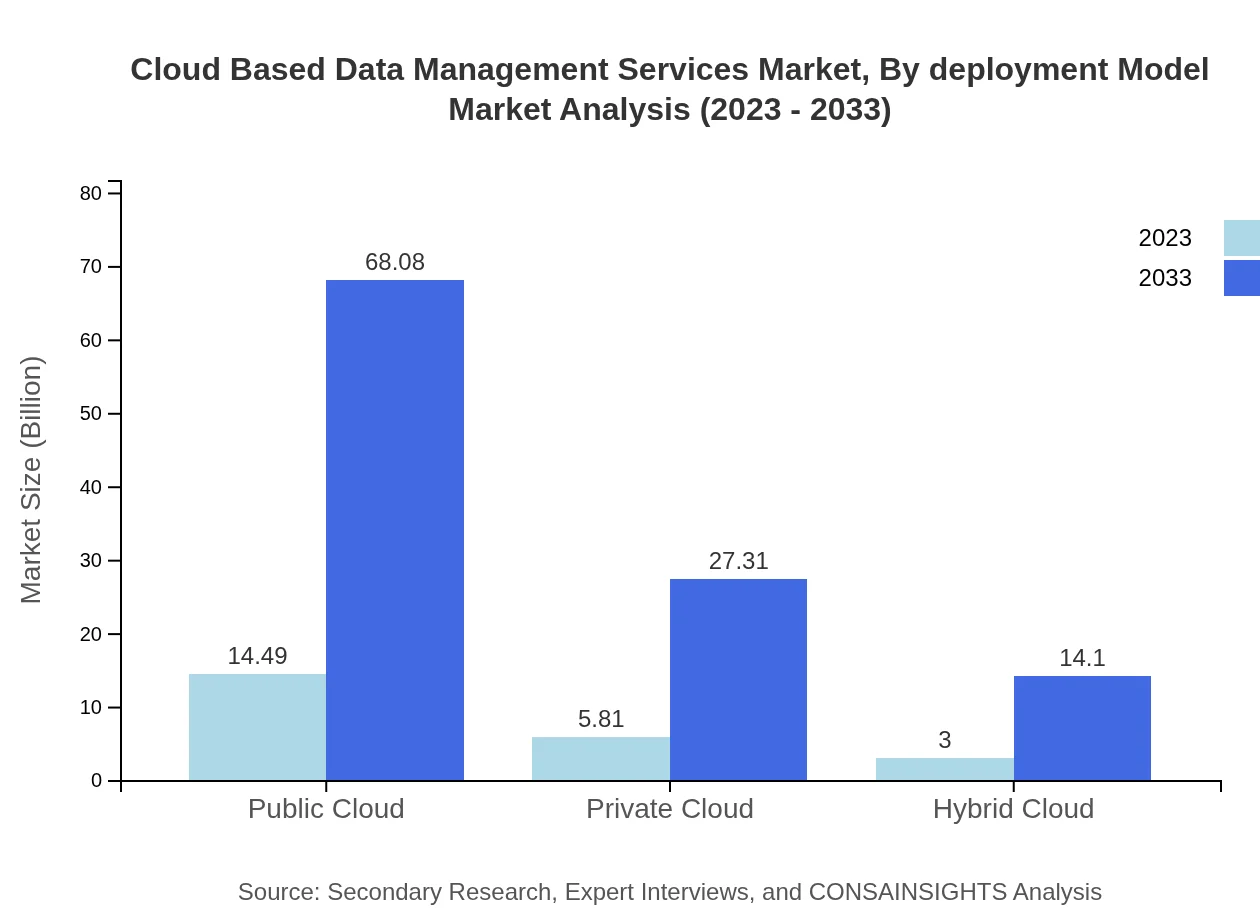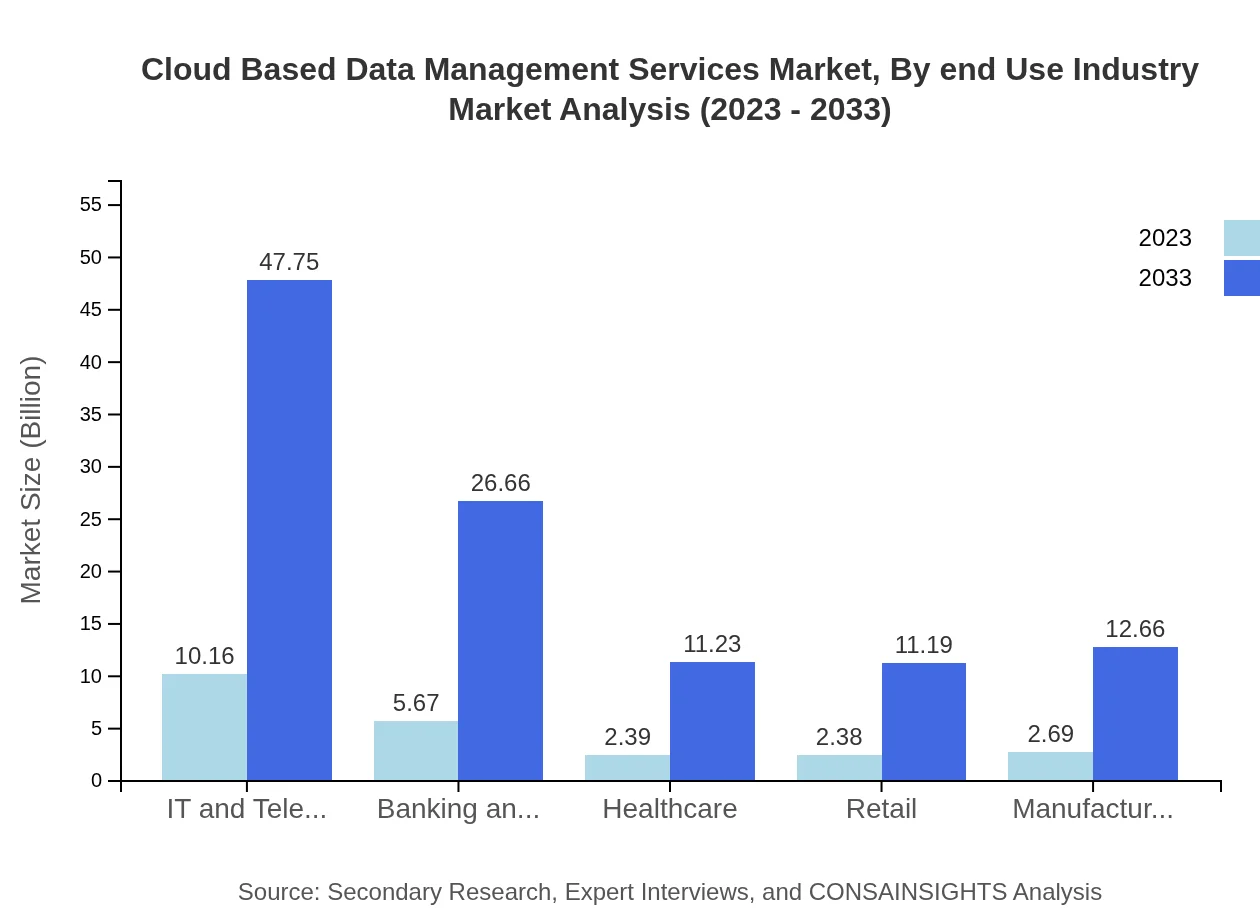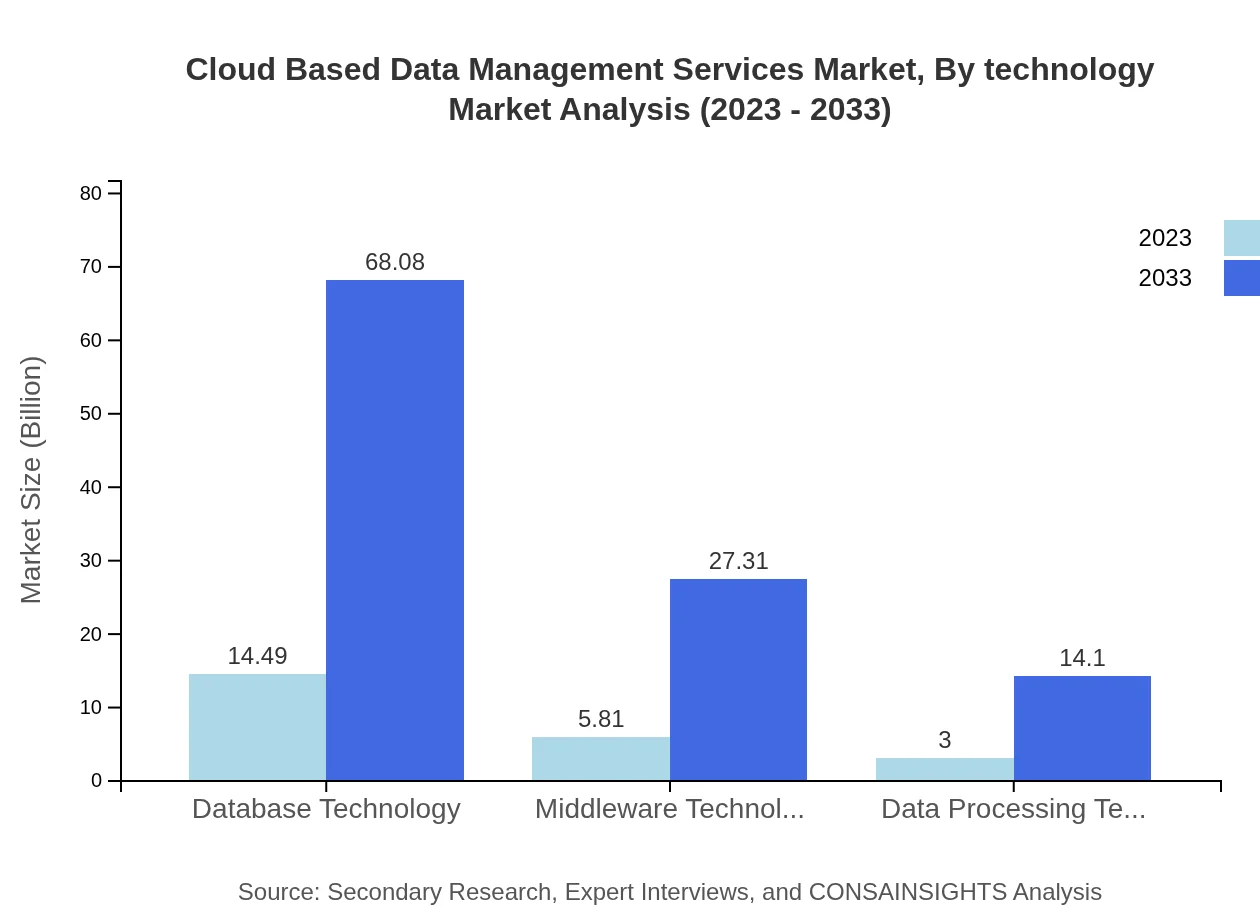Cloud Based Data Management Services Market Report
Published Date: 31 January 2026 | Report Code: cloud-based-data-management-services
Cloud Based Data Management Services Market Size, Share, Industry Trends and Forecast to 2033
This report presents a comprehensive analysis of the Cloud Based Data Management Services market, covering key insights, trends, and forecasts from 2023 to 2033. It explores market dynamics, segments, regional performance, and industry leaders within this rapidly evolving landscape.
| Metric | Value |
|---|---|
| Study Period | 2023 - 2033 |
| 2023 Market Size | $23.30 Billion |
| CAGR (2023-2033) | 15.9% |
| 2033 Market Size | $109.49 Billion |
| Top Companies | Amazon Web Services, Microsoft Azure, Google Cloud Platform, IBM Cloud, Oracle Cloud |
| Last Modified Date | 31 January 2026 |
Cloud Based Data Management Services Market Overview
Customize Cloud Based Data Management Services Market Report market research report
- ✔ Get in-depth analysis of Cloud Based Data Management Services market size, growth, and forecasts.
- ✔ Understand Cloud Based Data Management Services's regional dynamics and industry-specific trends.
- ✔ Identify potential applications, end-user demand, and growth segments in Cloud Based Data Management Services
What is the Market Size & CAGR of Cloud Based Data Management Services market in 2023?
Cloud Based Data Management Services Industry Analysis
Cloud Based Data Management Services Market Segmentation and Scope
Tell us your focus area and get a customized research report.
Cloud Based Data Management Services Market Analysis Report by Region
Europe Cloud Based Data Management Services Market Report:
The European market is expected to grow from USD 7.14 billion in 2023 to USD 33.55 billion in 2033. Rising data privacy regulations like GDPR are pushing organizations to seek compliant cloud solutions, thereby boosting market demand.Asia Pacific Cloud Based Data Management Services Market Report:
The Asia Pacific region is expected to witness significant growth, with the market projected to reach USD 21.38 billion by 2033, up from USD 4.55 billion in 2023. This growth is attributed to rising digital initiatives and increasing investments in cloud infrastructure across countries like India and China.North America Cloud Based Data Management Services Market Report:
North America dominates the Cloud Based Data Management Services market, with a projected size of USD 37.90 billion by 2033, growing from USD 8.07 billion in 2023. The presence of major cloud service providers and the increasing adoption of big data analytics contribute to this robust growth.South America Cloud Based Data Management Services Market Report:
In South America, the market is anticipated to grow from USD 0.99 billion in 2023 to USD 4.63 billion in 2033. The demand for cost-effective data management solutions is expected to drive this growth, particularly in Brazil and Argentina.Middle East & Africa Cloud Based Data Management Services Market Report:
In the Middle East and Africa, the market size is expected to grow from USD 2.56 billion in 2023 to USD 12.02 billion by 2033, driven by increasing digitalization efforts by governments and private sectors across the region.Tell us your focus area and get a customized research report.
Cloud Based Data Management Services Market Analysis By Service Type
The analysis of the Cloud Based Data Management Services market by service type indicates Database Technology and Data Integration Services as major contributors to market revenue. In 2023, Database Technology holds a market size of USD 14.49 billion, growing to USD 68.08 billion by 2033, while Data Integration Services is poised to expand from USD 12.43 billion to USD 58.41 billion in the same period.
Cloud Based Data Management Services Market Analysis By Deployment Model
In terms of deployment models, the Public Cloud segment leads with a market size reaching USD 14.49 billion in 2023 and anticipated to grow to USD 68.08 billion by 2033. Private Cloud and Hybrid Cloud models follow, with projected growth from USD 5.81 billion to USD 27.31 billion, and USD 3.00 billion to USD 14.10 billion, respectively.
Cloud Based Data Management Services Market Analysis By End Use Industry
By end-use industry, the IT and Telecom sector leads with a market growth from USD 10.16 billion in 2023 to USD 47.75 billion by 2033. Other sectors such as Banking and Financial Services, Healthcare, and Manufacturing also show robust growth, indicating widespread adoption of cloud services across industries.
Cloud Based Data Management Services Market Analysis By Technology
The analysis indicates significant advancements in technology enhancing Cloud Based Data Management Services. Innovative database technologies are becoming prevalent, with the market size for associated technologies expected to reach USD 68.08 billion by 2033. Technologies such as AI and machine learning are also being integrated into data management strategies to enhance analytics and operational efficiency.
Cloud Based Data Management Services Market Trends and Future Forecast
Tell us your focus area and get a customized research report.
Global Market Leaders and Top Companies in Cloud Based Data Management Services Industry
Amazon Web Services:
AWS leads the cloud computing market, providing extensive cloud-based data management, storage, and analytics services trusted by businesses globally.Microsoft Azure:
Microsoft Azure offers a comprehensive suite of cloud services, facilitating scalable data management solutions tailored for businesses of all sizes.Google Cloud Platform:
Google Cloud Platform specializes in data analytics and machine learning, significantly enhancing data management capabilities for organizations.IBM Cloud:
IBM Cloud combines advanced cloud technology with data management solutions focused on enterprise-grade capabilities and compliance.Oracle Cloud:
Oracle Cloud provides flexible and scalable cloud-based database management solutions, catering primarily to enterprise clients.We're grateful to work with incredible clients.









FAQs
What is the market size of cloud Based data management services?
The cloud-based data management services market is valued at $23.3 billion in 2023, with an impressive CAGR of 15.9% projected until 2033, indicating significant growth potential in this sector.
What are the key market players or companies in the cloud Based data management services industry?
Key players in the cloud-based data management services include major tech firms like Amazon Web Services, Microsoft Azure, Google Cloud, IBM, and Oracle, who dominate the market through innovative solutions and comprehensive service offerings.
What are the primary factors driving the growth in the cloud Based data management services industry?
The primary drivers for growth include the increasing demand for scalable data solutions, digital transformation initiatives across industries, the rise of big data analytics, and the growing need for efficient data governance and storage solutions.
Which region is the fastest Growing in the cloud Based data management services?
The fastest-growing region for cloud-based data management services is North America, expected to grow from $8.07 billion in 2023 to $37.90 billion in 2033, showcasing strong demand for technological advancements in this area.
Does ConsaInsights provide customized market report data for the cloud Based data management services industry?
Yes, ConsaInsights offers customized market report data tailored to specific needs in the cloud-based data management services industry, allowing clients to access detailed insights that fit their strategic requirements.
What deliverables can I expect from this cloud Based data management services market research project?
From this market research project, you can expect comprehensive reports, data analysis, market forecasts, competitor profiles, segment trends, and actionable insights to guide strategic decisions in the cloud-based data management services space.
What are the market trends of cloud Based data management services?
Key trends in the cloud-based data management services market include the emphasis on data security, increased adoption of multi-cloud strategies, growth in AI-driven analytics, and an ongoing shift towards managed service providers for data needs.

